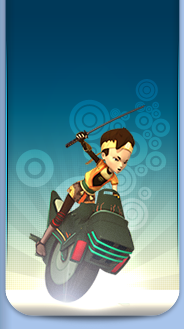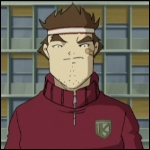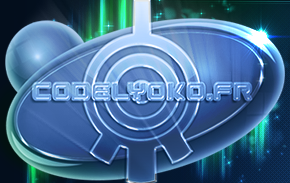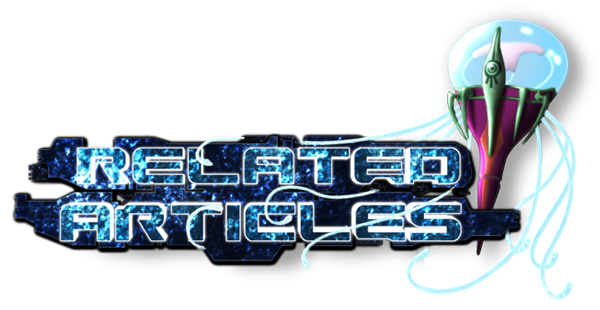
|
 |
French vs English
| | | Hello there, Lyokofan!
It's no secret that Code Lyoko is French in origin, so have you ever wondered just how accurate the English dub is compared to the original material? People are sometimes concerned that they may be missing out on something important due to censoring, so CodeLyoko.fr is here to put your mind at ease and satisfy your curiosity!
Here is the fruit of our labour: one huge file where we compare the original French episodes to the English ones.
[ Introduction] [ Methodology: comparing the French to the English] [ Name changes] [ Notable differences] [ All the differences...] [ Credits] | | |
|  | English dubs of foreign shows, especially Japanese shows, are sometimes known for their heavy editing. The studio may choose to censor mature language or themes in order to suit the English-speaking audience and what is considered appropriate in their own culture. In the worst cases, deep, emotional moments are dumbed down or lost completely. This censoring can even sometimes extend to editing the animation itself not only to translate text, but also to erase violent scenes, remove religious or inappropriate imagery, or replace cigarettes with lollipops...
This questionable accuracy to the source material is what draws many people to watching the show in its original form with subtitles, so that they don't miss anything due to censorship. As Code Lyoko is a French show, the question does sometimes arise: how accurate is the English dub compared to the original French?
Well, that's what this section intends to uncover! The CodeLyoko.fr team has undertaken the massive task of comparing the original French episodes to the English dubbed ones. Since Code Lyoko was dubbed by the same company that produced it, thankfully there were no edits to the animation (aside from just a single tiny background detail); the only differences can be found in the dialogue, which seems to be pretty accurate to the French for the most part. But there are still some differences in every episode, ranging from minor, unimportant phrasing differences to some pretty interesting changes!
On this welcome page, we describe our methods for performing this task and outline some of the changes that were consistent throughout the series. For anyone who wants to delve deeper, towards the bottom of the page you can find links to pages where you can find lists of all the dialogue changes to every individual episode. Have a nice read! |  | |
 | Methodology: comparing the French to the English | |
|  | Not long before commencing this endeavour, the author of this file transcribed all 97 episodes of Code Lyoko's English version. (You can find the transcripts here.) She then watched the series again in French, reading along with the English transcript while the French episode played in the background. Every time a change was noticed, the timestamp, French dialogue (with help from the original French scripts and CodeLyoko.fr's episode guide) and English dialogue were recorded in Notepad. After that, they were added to the file along with an English translation of the French dialogue.
Of course, certain changes are to be expected when translating from one language to another. It could be that a more direct translation didn't fit the way the characters' mouths were animated, or a joke or wordplay just didn't make sense in English so it had to be replaced. Some sentences on the other hand have very little relation to the original French dialogue. Here's a little introduction to what common differences are and aren't listed in this file.
What we have picked out...
| Name changes | | Changes to the names of various secondary and background characters, monsters and places throughout the series. | | French | French translation | English | Ulrich: Au croisement de l'avenue Molière et de la rue Méliès.
Episode 4 - Carnet de bord
| Ulrich: At the corner of Molière Avenue and Méliès Street.
Episode 4 - Carnet de bord
| Ulrich: At the corner of Washington Street and Franklin Avenue.
Episode 4 - Log Book
|
| Cultural differences | | Differences in units of measurement, school grading systems, food and various cultural references. | | French | French translation | English | Jeremy: Pour l'instant chui à 19,87 sur 20.
Episode 45 - Guerre froide
| Jeremy: At the moment I'm at 19.87 out of 20.
Episode 45 - Guerre froide
| Jeremy: 99.87 out of 100.
Episode 45 - Cold War
| Odd: Eh ben euh, c'est simple ! T'épouses Yumi et vous optez pour le rapprochement familial !
Episode 35 - Les jeux sont faits
| Odd: Well uh, it's simple! You marry Yumi and you opt for family reunification!
Episode 35 - Les jeux sont faits
| Odd: Well uh, you see, if you marry Yumi, then she can get a Green Card!
Episode 35 - The Chips Are Down
| Sissi: Ben ce qui signifie, qu'un kilo de mercure pèse au moins ah... au moins une tonne ?
Episode 46 - Empreintes
| Sissi: It means that a kilo of mercury weighs at least uh...at least a tonne?
Episode 46 - Empreintes
| Sissi: It means...uh...that a pound of metal weighs...a...euh...nearly a ton?
Episode 46 - Déjà Vu
| Odd: Couscous boulettes !
Episode 67 - Mauvaise réplique
| Odd: Meatballs and couscous!
Episode 67 - Mauvaise réplique
| Odd: Meatballs and spaghetti!
Episode 67 - Double Take
|
| Wordplay, rhymes and lyrics | | Puns, rhymes, lyrics, misheard words etc. that would lose their meaning if translated literally. | | French | French translation | English | Yumi: La fille mystérieuse, pas d'ici mais d'ailleurs. Elle voudrait le bonheur de sa planète curieuse ! Un vrai mystère pour moi, une love affair pour toi...
Episode 2 - Le voir pour le croire
| Yumi: The mysterious girl, not from here but from elsewhere. She wanted the happiness of her strange planet! A real mystery for me, a love affair for you...
Episode 2 - Le voir pour le croire
| Yumi: Mystery girl, from another world. Wanted happiness, and not a lot of stress. A strength there that's true, a love affair for you...
Episode 2 - Seeing is Believing
| Ulrich: Pas du tout, j'suis juste allergique au gâteau! Et toi avec ta tronche de cake, tu m'donnes des boutons.
Episode 5 - Big bogue
| Ulrich: Not at all, I'm just allergic to cake! And because you're such a fruitcake, you give me spots.
Episode 5 - Big bogue
| Ulrich: Not at all. I'm just allergic to anyone who's stuck up! And in that category, you win hands down.
Episode 5 - Big Bug
|
| Expanded or shortened lines, additional lines | | Characters' lines may sometimes have an extra sentence to them in one version and not the other. This is often because the audio needs to match the characters' mouth animations, so lines need to be padded or shortened to suit. This also includes entire additional lines or conversations that happen when a character is off screen. | | French | French translation | English | Aelita: Oh écoute, c'est pas la fin du monde ! Ça s'voit même pas que t'as des kilos en trop. Tu devrais pas t'inquiéter autant de ton apparence !
Episode 47 - Au meilleur de sa forme
| Aelita: Oh listen, it's not the end of the world! You can't even tell that you're a few kilos over by looking at you. You shouldn't worry so much about your appearance!
Episode 47 - Au meilleur de sa forme
| Aelita: Well you can't tell by looking at you.
Episode 47 - Tip-Top Shape
|
| Line swaps | | Lines that are spoken by a different character in either version. | | French | French translation | English | Ulrich: Il y a quelque chose devant !
Episode 71 - Premier voyage
| Ulrich: There's something up ahead!
Episode 71 - Premier voyage
| Yumi: There's something else up ahead!
Episode 71 - Maiden Voyage
|
| Translation mistakes | | Even professional translators make mistakes sometimes! And as the author of this file, I can't really blame them for some of them. Mistakes are more prevalent in season 1 than other seasons. | | French | French translation | English | Jeremy: Laisse-toi glisser jusqu'à l'étage en dessous. Tu arrives dans la salle des scanners.
Episode 17 - Mémoire morte
| Jeremy: Slide down to the level below. You'll arrive in the scanner room.
Episode 17 - Mémoire morte
| Jeremy: You've got to slide up one level. You'll see a few scanners.
Episode 17 - Amnesia
| Jeremy: Yumi, moins vingt points de vie. (...) Yumi... il ne te reste que vingt points de vie.
Episode 12 - Attaque en piqué
| Jeremy: Yumi, you lost twenty life points. (...) Yumi...you've only got twenty life points left.
Episode 12 - Attaque en piqué
| Jeremy: Less than twenty life points left, Yumi. (...) Yumi...you've only got twenty life points left.
Episode 12 - Swarming Attack
|
What we haven't picked out...
| Literal translations | | If you translate a line word for word, of course it won't sound the same. So long as the French and the English version of a line have the same meaning, the exact wording doesn't matter. | | French | French translation | English | Jeremy: XANA vous envoie ses monstres. Comme c'est original...
Episode 54 - Lyokô moins un
| Jeremy: XANA is sending you his monsters. How original...
Episode 54 - Lyokô moins un
| Jeremy: XANA is sending you some monsters. How original can you get?
Episode 54 - Lyoko Minus One
|
| Attacks and powers | | When a character says the name of their attack or power in one version but not the other. It's quite common with "Laser arrow" in particular for it to be said in the French version but not the English, but the reverse can happen as well. These may be included if there's something significant about a particular occurrence. | - Laser arrow
- Impact
- Shield
- Energy field
- Supersmoke |
| Additional calling of names | | Similar to the above, the characters will sometimes say one another's names an additional time in one version but not the other. This occurs quite often during battle. These may be included if there's something significant about a particular occurrence. | | French | French translation | English | Jeremy: Aelita ? Aelita, ici c'est Jérémie.
Episode 1 - Teddygozilla
| Jeremy: Aelita? Aelita, it's Jeremie.
Episode 1 - Teddygozilla
| Jeremy: Aelita? Aelita! Aelita, it's Jeremie!
Episode 1 - Teddygozilla
|
| Different timing or word order | | Sometimes the timing of a character's line will be just a few seconds off, for example they'll say it at 10:05 in the French version and at 10:10 in the English. It's also common for some lines to have sentences in a different order, especially when it comes to the virtualisation sequence. These may be included if there's something significant about a particular occurrence. | | French | French translation | English | Aelita: Mais j'pense plus qu'à ça justement... Rien qu'à imaginer la foule devant moi, j'en ai mal au ventre...
Episode 89 - Il est sensé d'être insensé
| Aelita: But that's all I can think about... I just have to picture the crowd in front of me and I get butterflies in my stomach...
Episode 89 - Il est sensé d'être insensé
| Aelita: Whenever I do, I get major butterflies in my stomach. I wish I could stop thinking about it.
Episode 89 - Music to Soothe the Savage Beast
|
|  | |
|  | The names of certain characters and most monsters were changed in the dub to sound better in English. While most of them are simply Anglicised versions of the original French names, others are completely unrelated. Season 1 is the most notorious for interesting character name changes, some of which didn't stick.
Not included in this list are names which may lose accented letters when written in English: for example, Jérémy becomes Jeremy. This list also doesn't include characters with incredibly minor roles, such as the airport staff or the leader of the biker gang. Check out the Kadic Album for a full list of students and teachers.
| Character names |  | FR | Hervé Pichon |  | FR | Noémie N'Guyen |  | FR | Emmanuel Maillard | | EN | Herb Pichon | EN | Naomi N'Guyen | EN | Mike (S1)
Emmanuel Maillard |  | FR | Christophe M'Bala |  | FR | Matthias Burel |  | FR | M. Benoît (EP12)
Michel Rouiller | | EN | Christopher M'Bala | EN | Matthias Durel (S2)
Matthias Burel | EN | Mr. Bennett (EP12)
Michael Riley |  | FR | M. Lièvre (EP9)
M. Fumey |  | FR | Yolande Perraudin |  | FR | Michel Belpois | | EN | Mr. Lieburg (EP9)
Mr. Fumey | EN | Dorothy (S1)
Yolanda Perraudin | EN | Michael Belpois |  | FR | Talia |  | FR | Pierre Nanquin |  | FR | Jean-Claude Tourcoing (JT) | | EN | Taelia* | EN | Peter Duncan | EN | Thomas Vincent (TV)** |
* Taelia's name was intended to be an anagram of "Aelita," but the pronunciation of "Taelia" didn't work well in French.
** TV's name was changed completely so that his initials had significance in English. In French, the term "JT" refers to a TV journalist.
| One special case worth mentioning is Jim! In the English dub, he's quite comfortable with all the students referring to him by his first name. But in the French, everyone refers to him as "Monsieur" (Sir), "Monsieur Jim" (Mister Jim) or "Monsieur Moralès" (Mister Morales), and the name "Jim" is considered very informal and inappropriate most of the time. In the French episode 26 "Faux départ" after Jim becomes friends with the group, he asks them to call him by his first name. Since this was already the case in the English dub, the name "Jimbo" was created as a more informal, friendly name for them to use. | | | What the students call Jim |  | FR | Monsieur
Monsieur Jim
Monsieur Moralès
Jim (informal) | | EN | Sir
Mister Morales
Jim
Jimbo (informal) |
|
And finally, XANA's monsters. Most of these are pretty straightforward but a few of them are quite different. It's a mystery to us why they eventually chose to use the French name "Kankrelat" in the English dub, but now you can find out what it means!
In this table, the (m) and (f) next to the French monster names are there because in the French language, nouns are either masculine or feminine. The row labelled "TR" (short for "translation") shows the original French word(s) the monster's name came from in italics (because Code Lyoko likes to replace certain letters with K) and the English translation of the word(s).
| Monster names |  | FR | Kankrelat (m) |  | FR | Blok (m) | | TR | cancrelat = cockroach | TR | bloc = block | | EN | Roachster (Some season 1 eps. only)
Kankrelat | EN | Blok |  | FR | Krabe (m) |  | FR | Frelion (m)
Frôlion (m) | | TR | crabe = crab | TR | frelon = hornet | | EN | Krab
Krabe | EN | Waspster (Some season 1 eps. only)
Hornet |  | FR | Mégatank (m) |  | FR | Tarentule (f) | | TR | méga tank = mega tank | TR | tarentule = tarantula | | EN | Megatank | EN | Tarantula |  | FR | Rampant (m) |  | FR | Manta volante (f) | | TR | rampant = creeping/crawling | TR | manta volante = flying manta | | EN | Creeper | EN | Flying Manta |  | FR | Gardien (m) |  | FR | Méduse (f) | | TR | gardien = guardian | TR | méduse = jellyfish | | EN | Guardian | EN | Scyphozoa* |  | FR | Kongre (m) |  | FR | Rekin (m) | | TR | congre = conger | TR | requin = shark | | EN | Konger | EN | Shark |  | FR | Kalamar (m) |  | FR | Kolosse (m) | | TR | calamar = squid | TR | colosse = colossus | | EN | - | EN | Kolossus |  | FR | Spectre (m) |  | FR | Clone (m)
Clone polymorphe (m)
Spectre polymorphe (m)
Polymorphe (m) | | TR | spectre = spectre/specter | TR | clone = clone
polymorphe = polymorph(ic)
spectre = spectre/specter | | EN | Ghost
Spectre (UK)
Specter (US) | EN | Clone
Polymorphic/polymorphing clone
Polymorphic/polymorphing spectre
Polymorph |
* Scyphozoa is a scientific class of jellyfish. |  | |
|  | There are a number of differences that recur so often throughout the series they deserve a special mention here, rather than listing them in every episode.
 | Although he never says any human words, Kiwi actually has a different voice actor in the French and the English! This means that the noises he makes are always different between the two versions. |  | The English dub of season 1 was made after the original French episodes were completed, so the translation was based on the finalised dialogue rather than what was written in the original scripts. As such, there aren't as many differences to be found in season 1. From season 2 onwards, the two versions were produced around the same time, so they were both based on the original scripts. This resulted in a number of differences, often when the French version would deviate from the script while the English dub would stick to it. |  | There's just one visual difference between the two versions of the series, and it's the sign on the fence of the Hermitage. It reads "Ermitage" in the French and "Hermitage" in the English (unless the version of the episode you're watching is the French episode with the English audio, like many of the episodes available on the official YouTube channel). |  | As mentioned above, from season 2 onwards, the characters will often say the name of their attack or power in one version but not the other. This is especially common with "Laser arrow," which is said quite often in the French version of seasons 2-4 and is noticeably rarer in the English dub. This also includes "Impact," "Shield," "Energy field" and "Supersmoke." |  | Many of the foods talked about in the French version are distinctly French and the English dub often changes them to something the English-speaking audience will be more familiar with. When a food appears on screen they obviously need to call it what it looks like, but there's one food that gets changed a lot: what they call meatballs and couscous in the French is known as meatballs and gravy in the English version. The white stuff served with the meatballs is said to be potato in the English, but it's actually couscous in the French! |  | "Good buddy" is a recurring term in the English dub. It's used by several different characters, but it's most well known among fans as something that Odd and Ulrich call each other. French equivalents in these instances are terms such as "(mon) (vieux) frère" ((my) (old) brother), "(mon) vieux" ((my) old friend) and "(mon) pote" ((my) buddy). |  | In the French version, Jim makes a number of accidental self-burns by turning the phrase jouer au plus malin/fin (play who's smarter) into phrases like "jouer au plus idiot/crétin" (play who's stupider/dumber) and then saying he's always the winner in these "games." In other words, he's saying he's always the stupider one... The English translations of these phrases were never self-deprecating; he didn't mess up any of the phrases he was trying to use. |  | "T'y crois pas" is a repeated phrase used by Odd in the French version of season 4. It's a variation of the phrase j'y crois pas (I don't believe it). Unfortunately it wasn't translated consistently in the English dub and as a result it didn't end up being a sort of catchphrase like it was in the French. Common translations include "unbelievable," "incredible," and "I don't/can't believe it," but there were also some very different translations that you'll find on the full list of differences. |  | In the English version, the characters often say "factory" when they mean "lab." This is especially common in season 4. It's not a problem most of the time, but it occasionally results in errors where a character will say something like "Get back to the factory" when they're already in the factory. |  | Many fans have noticed a number of things about the dialogue in the English dub: characters say "um" and "uh" a lot, and in season 4 the dialogue is sometimes sped up or syllables are cut off at the beginning or ends of sentences. It's widely assumed that these are all used to pad out or shorten the dialogue to suit mouth animations done for a different language, and this is true for the most part. However, the sped-up dialogue is present in the French version of season 4 as well, so it can't be blamed solely on the English dub. |
Terms and phrases relating to the Skidbladnir and Teleportation are worth noting in their own table. What's most interesting here isn't the English translations of the French terms, but just how inconsistent the dub was with its translations. In the French there will be one set term for every process, and the English dub can have up to four different translations for each of them!
Not only that, but the dub often shied away from using particular terms: the word "Energise" (or "Energize") gets used a lot despite not existing in the French, and the characters often say "Here we go" in place of several of the terms, particularly embarquement and débarquement. They also went out of their way to avoid saying the word "Deteleport" for some reason, which seems like an obvious translation of détranslater but is never used.
| Skidbladnir-related terminology | | French | French translation | English | | Garage Skid* | Skid Garage | Skid Hangar
Dry-dock
Skid Garage (Ep. 87 only) | | Plots d'embarquement | Embarkation pads | Teleport(er) spots | | Embarquement | Embarkation | Energise
Embarking (Ep. 81 only) | | Débarquement | Disembarkation | Disembark(ing)
Energise (Ep. 73 only)
Teleport (Ep. 75 only) | | Désarrimage | Undocking | Releasing support(s)
Supports away
Release docking mechanism | | Propulsion verticale enclenchée | Vertical propulsion engaged | (Ignition,) Powering vertical
Vertical propulsion operational | | Propulseurs lasers | Laser propellers/thrusters | Laser generators | | Largage | Release/casting off | Navskids away | | Récupération | Recovery | Navskids in | | Accélération à haut débit | High-speed/Broadband acceleration | High-speed acceleration
Broadband acceleration | | Sas (d'entrée) | (Entry) Airlock | (Entry) Portal
Floodgate/Gate (Ep. 71 only)
Entrance (Ep. 79 only) | | Arrimer/Arrimage | Dock/Docking | Dock/Docking
Anchor (Ep. 77 only)
Moor (Ep. 78 only)
Secure (Ep. 78 only) | | Translation/Translater | Translation/Translate | Teleportation/Teleport
Energise | | Détranslation/Détranslater | Detranslation/Detranslate | Teleportation/Teleport (back)
De-energise |
* "Garage Skid" is an anagram of "Garage Kids," the name of the series pilot! |  | |
|  | Now that you've seen a run-down of the most common differences between the French version and the English version, you can find more detailed lists on the pages linked below. The season 1 pages are somewhat short, but they grow to be rather long by season 4.
This file was compiled by a non-native French speaker and hasn't yet been translated into French. The information should be accurate for the most part, but it's possible that there are some mistakes in the transcriptions or some of the translations. The information on these pages is subject to change if and when they're proofread and translated by a native French speaker.
One page covers about 13 episodes, so each season has been split into two pages. The direct access is below.
|  | |
|  | French to English comparison
A_QueenOfFairys (March 2018 - June 2019)
With the native French assistance of
Etienne, Shaka, Morgiane and Nelbsia
French editing
Icer
Project inspiration
From Scripts to Episodes by Shaka, Aquatikelfik and Etienne
Page format based on Shaka's formatting for From Scripts to Episodes |  | |
| | |

[File]
From scripts to episodes.
A comprehensive list of differences between the original episode scripts and the final episodes, including deleted scenes and changes to action or dialogue. |
| | |
|
 |

















